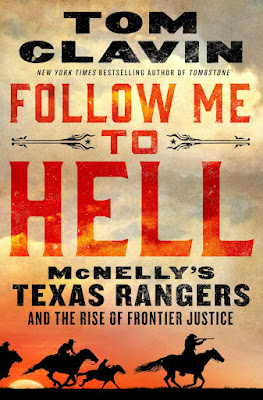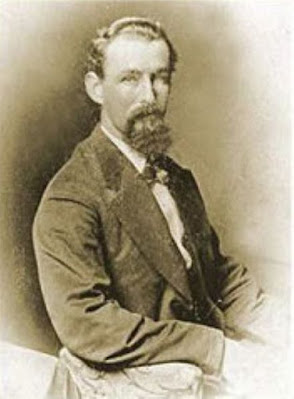The Washington Times ran my On Crime column today on Tom Clavin’s latest book about Wild West history.
You can read the column via the below link or the below text:
BOOK REVIEW: 'Follow Me to Hell' - Washington Times
I’ve read and enjoyed Tom Clavin’s earlier Western histories, such as “Dodge City,” “Tombstone” and “Wild Bill,” all of which I’ve covered here. So I was pleased to read Mr. Clavin’s most recent look at the Wild West, “Follow Me to Hell: McNelly’s Texas Rangers and the Rise of Frontier Justice.”
I contacted Mr. Clavin and asked him why
he chose to write about Leander McNelly (seen in the above photo), who is not as well known as Wyatt
Earp, Doc Holliday or Wild Bill Hickok.
“McNelly’s lack of fame — outside of
Texas, that is — was appealing,” Mr. Clavin replied. “In a way, figures like
Earp and Hickok are low-hanging fruit because of that instant name recognition.
I was attracted to the idea of finding a character who has been overlooked yet
has an exciting story. I wanted to do a Texas Rangers book because of the
bicentennial but find a character and story a bit off the beaten path.”
Who
was Leander McNelly? How would you describe him?
“He was the most famous and effective of
company captains when the Texas Rangers in the 1870s were transitioning from a
militia-like outfit to a durable law enforcement agency. Because of poor
health, and dying at 33, McNelly led his men for only three years yet his
courage and charisma and strong belief in law and order made a powerful
impression.”
How
would you describe the type of men who joined the early Texas Rangers?
“The first word that comes to mind is
‘adventurous.’ Maybe a guy made $40 a month, so even cowpuncher paid better.
Some sense that law enforcement was a worthy endeavor. Curiosity. Mostly, I
think, it was a way for young men to play at being lawmen, and some came to
take it seriously, and while that was happening, they got to ride with
like-minded fellows across swaths of Texas with the prospect of exciting
adventures ahead.”
How
did the leadership of McNelly change the Texas Rangers?
“He made use of embedded spies in
opponents’ camps, which became an effective tool. He carried on the tradition
of the best Ranger captains, like Samuel Walker and John Coffee Hays, of
leading from the front. His personal integrity and fearlessness were inspiring
not only to his men, but to future Rangers. He helped to make being a Texas
Ranger a proud occupation.”
How
would you describe the American and Mexican outlaws, the Apaches and the
Comanches that the Texas Rangers fought?
“On one hand, you can sympathize with
them. As the colony of Anglos in Texas expanded from 1821 on, Mexicans and
Indians were being pushed aside and eventually overwhelmed by the increasing
number of White Americans. Resisting made them ‘outlaws.’ However, the violence
was fierce, and many settlers, whose only crime was establishing homesteads,
met cruel fates. It is remarkable that Stephen Austin’s colony survived at
all.”
How
would you describe the Mexican-Texas border area that the Texas Rangers
operated in?
“Too long to patrol effectively … which,
of course, many people would say remains true. Ranger companies had to ride
hard and fast to try to stop cattle rustling, horse stealing, and raids on
settlements. There were plenty of places along the Rio Grande that were easy to
cross and there often seemed to be more rustlers than Rangers.”
You
also write about the notorious outlaw John Wesley Hardin in the book. How would
you describe him?
“’Man-killer’ is the word most
associated with him. He began killing as an adolescent and did not stop until
he was sent to prison for many years. He loved his wife and children and
probably his dogs but without hesitation would kill anyone who crossed him or
his kin.”
What
other especially bad men did McNelly come up against?
“One of my favorite characters in the
book is John King Fisher, a young rancher who ruled all he surveyed in south
Texas with a six-shooter and a Winchester and his gang of frontier toughs. Yet
his life changed when confronted by Leander McNelly. Ironically, Fisher died
while serving as a lawman.”
Why
are you drawn to write about the Wild West and the histories of the people who
helped shape the West?
“I’m like a kid who ran off and joined
the circus and never came back. I grew up at a time when our popular culture
was full of Western films, and it seemed like half the shows on TV were
Westerns — “Gunsmoke,” “Rawhide,” “Bonanza,” Have Gun, Will Travel,” etc. In my
mind, anyway, the Wild West was always a fun place to be. Today, decades later,
through research and writing, I’m still there. Glad we’ve advanced from
outhouses, though.”
•
Paul Davis’ On Crime column covers true crime, crime fiction and thrillers.
• •
•
FOLLOW ME TO HELL: McNELLY’S TEXAS
RANGERS AND THE RISE OF FRONTIER JUSTICE
Tom Clavin
St. Martin’s, 384 pages, $29.99
Note: Below is a photo of Tom Clavin:




No comments:
Post a Comment